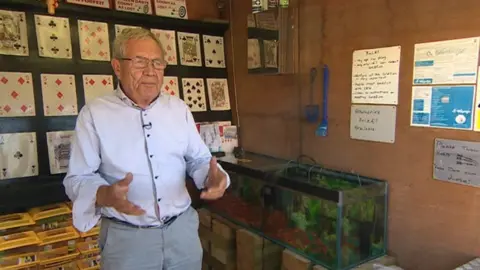Animal cruelty: RSPCA urges Wales ban on fair prize pets
 Getty Images
Getty ImagesA century-old tradition of goldfish as funfair prizes could come to an end as the RSPCA calls for a Wales-wide ban.
It comes after Vale of Glamorgan became the fifth of Wales' 22 councils to ban the practice after a Senedd petition was launched in 2019.
The animal welfare charity said goldfish given as prizes in fairgrounds could end up living in poor conditions.
But the owner of Barry Island Pleasure Park in Vale of Glamorgan said the fish at his park did not suffer.
Vale of Glamorgan has joined Newport, Caerphilly, Wrexham and Conwy councils in banning giving pets as prizes.
Next Thursday another one, Pembrokeshire, will discuss a motion put forward by one member, Alistair Cameron, calling for it to support the campaign by banning live animals as prizes on council land.
The motion also calls for Pembrokeshire to ask the Welsh government for an outright ban.
Councils across Wales have been urged by the RSPCA to protect animals that may suffer poor living conditions as a result of being given away.
Last year, more than 9,000 RSPCA supporters asked their local authority to ban the practice from happening in their area.
In England and Wales, fish cannot be given away as prizes to a person under 16 who is unaccompanied by an adult.
Five councils in Wales and 22 in England have implemented bans or are taking action against the practice.
 Getty Images
Getty ImagesChris O'Brien of RSPCA Cymru said: "With Covid restrictions now completely eased in Wales, there's a real risk that the giving of goldfish as prizes will return in big numbers as funfairs and festivals resume.
"Animal ownership is a big responsibility - and goldfish shouldn't be acquired via a spur-of-the-moment game.
"Goldfish are easily stressed and very often fish that are won as prizes suffer miserably from shock, oxygen starvation or die from changes in water temperature, and many may die before their new owners can even get them home."

Henry Danter, who owns Barry Island Pleasure Park, said there was no suffering for the fish, and he had people come back and tell him they have had them for 20 or 30 years.
Goldfish had been given out as prizes at the park for more than 100 years and Mr Danter said: "Our safety officer would go down there and make sure everything was correct, if vendors didn't keep the goldfish to a very high standard he would have to answer to me.
"I have concessionaires who make their living from it and if they're going to ban giving goldfish on an amusement park, they should also look into the cruelness in the fishing industry, that makes more sense to me than looking at a goldfish as a prize."

RSPCA advice for keeping goldfish
- Young goldfish should be kept in at least 60 litres of water per fish, with adults needing even more space
- Find out about what food, how often and how much your fish will eat. Avoid overfeeding by giving food little and often
- Include plants to promote the growth of aquatic animals for extra food

 Getty Images
Getty ImagesSteven Brown, 28, who works at Maidenhead Aquatics in Cardiff, said: "Every now and again, we get the goldfish brought in with the tiny little bowl they come with at the fair.
"We've had a couple of fish won at a fair returned to us that can barely swim from the bottom of a tank.
"Most people who keep a goldfish in a bowl say it's fine: they live for five years, but when you tell them they can live for over 30 they have no idea."
The Welsh Local Government Association (WLGA) said: "Local authorities in Wales have very wide responsibility in terms of ensuring animal health and welfare, they advise businesses and owners, licensing of animal establishments, and enforcement when necessary to ensure standards are met.
"The WLGA assists councils by discussing matters in relation to new policy decisions such as this, to ensure as far as possible a consistent approach is taken across Wales."

- CHALLENGING MISCONCEPTIONS: Life in Britain’s biggest special school
- BORN DEAF, RAISED HEARING: What it means to live in two different worlds

